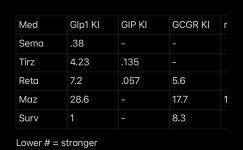Had to use chatgpt...
The
GLP-1 K value is a measure of the binding affinity of a ligand (such as a GLP-1 receptor agonist) to the GLP-1 receptor. GLP-1 (glucagon-like peptide-1) is a hormone that plays a role in glucose metabolism, and its receptor is a target for drugs used in the treatment of type 2 diabetes and obesity.
Key points about the GLP-1 K value:
- Definition of K value:
- The "K" generally refers to a dissociation constant (KdK_dKd) or inhibition constant (KiK_iKi), depending on the context.
- KdK_dKd: Reflects the concentration of ligand at which half of the available receptors are bound.
- KiK_iKi: Indicates the potency of a compound in inhibiting receptor binding.
- Units:
- The KdK_dKd or KiK_iKi is typically expressed in molar concentrations (e.g., nM, μM).
- Lower KdK_dKd or KiK_iKi values indicate higher affinity, meaning the ligand binds more tightly to the receptor.
- Significance in GLP-1 receptor agonists:
- A low K value suggests a strong and specific interaction between the drug and the GLP-1 receptor.
- Drugs like semaglutide and liraglutide are engineered to have high affinity and prolonged activity at the GLP-1 receptor, often reflected in low KdK_dKd values.
- Experimental determination:
- The KKK value is determined through in vitro binding studies, using methods like radioligand binding assays or surface plasmon resonance.
The
GCGR KiK_iKi value refers to the
inhibition constant for the glucagon receptor (GCGR). It measures how effectively a compound, such as a drug or inhibitor, can block the interaction of glucagon (or another ligand) with the glucagon receptor.
Breaking Down the Term:
- GCGR (Glucagon Receptor):
- GCGR is a G-protein-coupled receptor (GPCR) that binds glucagon, a hormone involved in glucose metabolism. Activation of GCGR stimulates glucose production in the liver, playing a key role in blood sugar regulation.
- KiK_iKi (Inhibition Constant):
- KiK_iKi quantifies the potency of an inhibitor in preventing a ligand (like glucagon) from binding to the receptor.
- It is defined as the equilibrium constant for the dissociation of the inhibitor-receptor complex.
- Lower KiK_iKi values indicate higher inhibitory potency because the compound binds more tightly to the receptor.
- Units:
- KiK_iKi is typically expressed in molar concentrations (e.g., nanomolar [nM] or micromolar [μM]).
- How it’s Measured:
- KiK_iKi is determined experimentally, often through competitive binding assays. These assays involve measuring how well an inhibitor competes with a radiolabeled or fluorescent ligand for binding to the receptor.
- Significance:
- KiK_iKi helps assess the efficacy of potential drugs targeting the glucagon receptor, particularly for conditions like type 2 diabetes.
- Drugs with low KiK_iKi values for GCGR might act as antagonists to reduce excessive glucagon activity, which can help in managing hyperglycemia.

